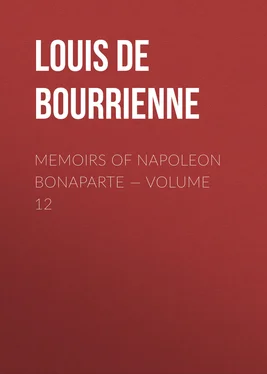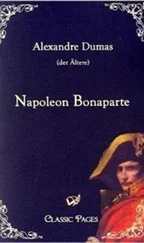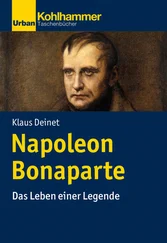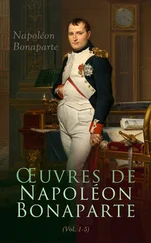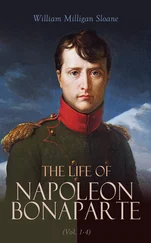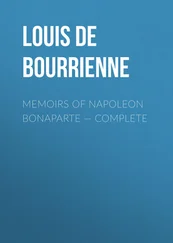Louis Bourrienne - Memoirs of Napoleon Bonaparte — Volume 12
Здесь есть возможность читать онлайн «Louis Bourrienne - Memoirs of Napoleon Bonaparte — Volume 12» — ознакомительный отрывок электронной книги совершенно бесплатно, а после прочтения отрывка купить полную версию. В некоторых случаях можно слушать аудио, скачать через торрент в формате fb2 и присутствует краткое содержание. Жанр: Биографии и Мемуары, История, foreign_edu, foreign_antique, foreign_prose, на английском языке. Описание произведения, (предисловие) а так же отзывы посетителей доступны на портале библиотеки ЛибКат.
- Название:Memoirs of Napoleon Bonaparte — Volume 12
- Автор:
- Жанр:
- Год:неизвестен
- ISBN:нет данных
- Рейтинг книги:5 / 5. Голосов: 1
-
Избранное:Добавить в избранное
- Отзывы:
-
Ваша оценка:
- 100
- 1
- 2
- 3
- 4
- 5
Memoirs of Napoleon Bonaparte — Volume 12: краткое содержание, описание и аннотация
Предлагаем к чтению аннотацию, описание, краткое содержание или предисловие (зависит от того, что написал сам автор книги «Memoirs of Napoleon Bonaparte — Volume 12»). Если вы не нашли необходимую информацию о книге — напишите в комментариях, мы постараемся отыскать её.
Memoirs of Napoleon Bonaparte — Volume 12 — читать онлайн ознакомительный отрывок
Ниже представлен текст книги, разбитый по страницам. Система сохранения места последней прочитанной страницы, позволяет с удобством читать онлайн бесплатно книгу «Memoirs of Napoleon Bonaparte — Volume 12», без необходимости каждый раз заново искать на чём Вы остановились. Поставьте закладку, и сможете в любой момент перейти на страницу, на которой закончили чтение.
Интервал:
Закладка:
The first actions were the battle of Dresden, which took place seven days after the rupture of the armistice, and the battle in which Vandamme was defeated, and which rendered the victory of Dresden unavailing. I have already mentioned that Moreau was killed at Dresden. Bavaria was no sooner rid of the French troops than she raised the mask and ranged herself among our enemies.
In October the loss of the battle of Leipsic decided the fate of France. The Saxon army, which had long remained faithful to us, went over to the enemy during the battle. Prince Poniatowski perished at the battle of Leipsic in an attempt to pass the Aster.
I will here mention a fact which occurred before Duroc's departure for the campaign of 1812. I used often to visit him at the Pavilion Marsan, in the Tuileries, where he lodged. One forenoon, when I had been waiting for him a few minutes, he came from the Emperor's apartments, where he had been engaged in the usual business, He was in his court-dress. As soon as he entered he pulled off his coat and hat and laid them aside. "I have just had a conversation with the Emperor about you," said he. "Say nothing to anybody. Have patience, and you will be—" He had, no sooner uttered these words than a footman entered to inform him that the Emperor, wished to see him immediately. "Well," said Duroc, "I must go." No sooner was the servant gone than Duroc stamped violently on the floor, and exclaimed, "That ——- ——- never leaves me a moment's rest. If he finds I have five minutes to myself in the course of the morning he is sure to send for me." He then put on his coat and returned to the Emperor, saying, "Another time you shall hear what I have to tell you."
From that time I did not see Duroc until, the month of January 1813. He was constantly absent from Paris, and did not return until the end of 1812. He was much affected at the, result of the campaign, but his confidence in Napoleon's genius kept up his spirits. I turned the conversation from this subject and reminded him of his promise to tell me what had passed between the Emperor and himself relative tome. "You shall hear," said he. "The Emperor and I had been playing at billiards, and, between ourselves, he plays very badly. He is nothing at a game which depends on skill. While negligently rolling his balls about he muttered these words: 'Do you ever see Bourrienne now?'—'Yes, Sire, he sometimes dines with me on diplomatic reception-days, and he looks so droll in his old-fashioned court-dress, of Lyons manufacture, that you would laugh if you saw him.'—'What does he say respecting the new regulation for the court-dresses?'—'I confess he says it is very ridiculous; that it will have no other result than to enable the Lyons manufacturers to get rid of their old-fashioned goods; that forced innovations on the customs of a nation are never successful.'—'Oh, that is always the way with Bourrienne; he is never pleased with anything.'— 'Certainly, Sire, he is apt to grumble; but he says what he thinks.'— 'Do you know, Duroc, he served me very well at Hamburg. He raised a good deal of money for me. He is a man who understands business. I will not leave him unemployed. Time must hang heavily on his hands. I will see what I can do for him. He has many enemies.'—`And who has not, Sire?'— 'Many complaints against him were transmitted to me from Hamburg, but the letter which he wrote to me in his justification opened my eyes, and I begin to think that Savary had good motives for defending him. Endeavours are made to dissuade me from employing him, but I shall nevertheless do so at last. I remember that it was he who first informed me of the near approach of the war which we are now engaged in. I forget all that has been said against him for the last two years, and as soon as peace is concluded, and I am at leisure, I will think of him.'"
After relating to me this conversation Duroc said, "you must, of course, feel assured that I said all I think of you, and I will take an opportunity of reminding him of you. But we must we patient. Adieu, my dear friend; we must set off speedily, and Heaven knows when we shall be back again!" I wished him a successful campaign and a speedy return. Alas! I was doomed to see my excellent friend only once again.
Next to the death of Duroc the loss most sincerely regretted during the campaign of 1813 was that of Prince Poniatowski. Joseph Poniatowaki, a nephew of Stanislas Augustus, King of Poland, was born at Warsaw on the 7th of May 1763: At an early age he was remarkable for his patriotic spirit; but his uncle's influence gave him an apparent irresolution, which rendered him suspected by some of the parties in Poland. After his uncle had acceded to the Confederation of Targowitz, Poniatowski left the service accompanied by most of his principal officers. But when, in 1794, the Poles endeavoured to repulse the Russians, he again repaired to the Polish camp and entered the army as a volunteer. His noble conduct obtained for him the esteem of his countrymen. Kosciusko gave him the command of a division, with which he rendered useful services during the two sieges of Warsaw. Immediately after the surrender of that capital Poniatowski went to Vienna. He refused the offers of Catherine and Paul to bear arms in the service of Russia.
Poniatowaki retired to his estate year Warsaw, where he lived like a private gentleman until the creation of the Grand Duchy of Warsaw revived the hopes of the Polish patriots. He then became War Minister. The Archduke Ferdinand having come, in 1809, with Austrian troops to take possession of the Duchy of Warsaw, Poniatowski, who commanded the Polish troops, which were very inferior in numbers to the Austrian force, obliged the latter, rather by dint of skillful maneuvering than by fighting, to evacuate the Grand Duchy. He pursued them into Galicia as far as Cracow.
After this honourable campaign he continued to exercise his functions as Minister until 1812. The war against Russia again summoned him to the head of the Polish army. After taking part in all the events of that war, which was attended by such various chances, Poniatowaki was present at the battle of Leipsic. That battle, which commenced on the 14th of October, the anniversary of the famous battles of Ulm and of Jena, lasted four days, and decided the fate of Europe. Five hundred thousand men fought on a surface of three square leagues.
Retreat having become indispensable, Napoleon took leave at Leipsic of the King of Saxony and his family, whom he had brought with him from Dresden. The Emperor then exclaimed in a loud voice, "Adieu; Saxons," to the people who filled the market-place, where the King of Saxony resided. With some difficulty, and after passing through many turnings and windings, he gained the suburb of Runstadt and left Leipsic by the outer gate of that suburb which leads to the bridge of the Elster, and to Lindenau. The bridge was blown up shortly after he had passed it, and that event utterly prevented the retreat of the part of the army which was on the left bank of the Easter, and which fell into the power of the enemy. Napoleon was at the time accused of having ordered the destruction of the bridge immediately after he had himself passed it in order to secure his own personal retreat, as he was threatened by the active pursuit of the enemy. The English journals were unanimous on this point, and to counteract this opinion, which was very general, an article was inserted in the 'Moniteur'.
Before passing the bridge of the Elster Napoleon had directed Poniatowski, in concert with Marshal Macdonald, to cover and protect the retreat, and to defend that part of the suburb of Leipsic which is nearest to the Borne road. For the execution of these orders he had only 2000 Polish infantry. He was in this desperate situation when he saw the French columns in full retreat and the bridge so choked up with their artillery and waggons that there was no possibility of passing it. Then drawing his sword, and turning to the officers who were near him, he said, "Here we must fall with honour!" At the head of a small party of cuirassiers and Polish officers he rushed on the columns of the Allies. In this action he received a ball in his left arm: he had already been wounded on the 14th and 16th. He nevertheless advanced, but he found the suburb filled with Allied troops.
Читать дальшеИнтервал:
Закладка:
Похожие книги на «Memoirs of Napoleon Bonaparte — Volume 12»
Представляем Вашему вниманию похожие книги на «Memoirs of Napoleon Bonaparte — Volume 12» списком для выбора. Мы отобрали схожую по названию и смыслу литературу в надежде предоставить читателям больше вариантов отыскать новые, интересные, ещё непрочитанные произведения.
Обсуждение, отзывы о книге «Memoirs of Napoleon Bonaparte — Volume 12» и просто собственные мнения читателей. Оставьте ваши комментарии, напишите, что Вы думаете о произведении, его смысле или главных героях. Укажите что конкретно понравилось, а что нет, и почему Вы так считаете.
